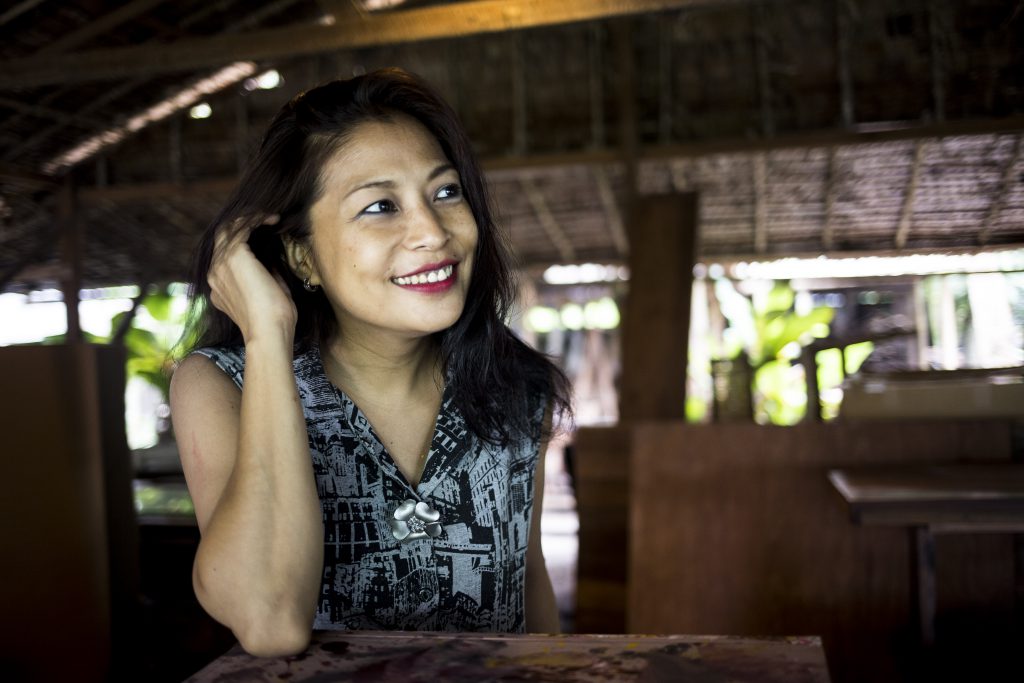Christina Win is the owner of Yangon Green Furniture. It is one of the few companies in Yangon making furniture from recycled and reclaimed timber and focusing on the domestic market. When Christina Win returned to Myanmar after living in Thailand, Israel, Australia and Singapore, she found it difficult to buy the furniture she wanted for her apartment. Trained as a jewellery designer, she began designing furniture in 2013 and the next year opened Yangon Green Furniture in a house built by her grandparents in Mayangone Township. Christina Win spoke to Frontier about her decision to use reclaimed timber, the challenges she faces in the market and the future of eco-friendly products in Myanmar.
Is it challenging to sell furniture made from reclaimed wood on the domestic market?
It is sad but unavoidable that old warehouses, government buildings and bridges are being demolished as Yangon continues to develop. I like the idea of recycling but the concept of [using] reclaimed wood is not common in this country yet. But I think it is a waste to not use the beautiful weathered wood, so I decided to use it as the main material to build my furniture. It’s good for the environment and it‘s good to use as materials. I think it’s a win-win situation.
However, up until now it is difficult to sell Myanmar people furniture made from reclaimed wood. They often ask me suspiciously, “Is the wood clean?”. They are afraid that the wood I use is from funeral homes or from houses that burnt down and there might still be spirits in the wood. And there’s also the habit that you need new furniture when moving into a new house, which is still a very common concept here.
At this stage of my business, I would say 98 percent of my customers are foreigners, Especially a lot of repats looking for furniture like school tables ands study chairs from their childhood memories but turned into a modern piece.
Is it easy to find skilled tradesmen? Are they ever confused by your designs?
It is hard to find carpenters, but that’s mainly because of all the construction going on in the country. I have about seven carpenters and none of them wants to leave the company. I don’t pay them stable monthly salaries that cannot motivate them to learn and work hard. They are paid depending on their skill, speed and how good the business is going. It’s interesting to see my Christian and Buddhist carpenters praying to their gods wishing me luck to sell more product so they can also earn more money.
I love to turn traditional Myanmar pieces into modern furniture. A common practice in the workshop is turning old colonial-style windows or doors into tables. I’ve just added height to a traditional xylophone, making it into a table, and am planning to add lights underneath the bamboo plates, so it can be an instrument, a table, a decoration or a lamp. One of my products that really surprised my staff is that I asked my them to frame a traditional Myanmar doormat and hang it on the wall as an art piece. They all thought it made no sense at first, but the hand-woven doormat had a special pattern, and a doormat like this is hard to come by nowadays. After working for some time together, I have learned a lot from my carpenters, but I think they also understand my taste now.
What’s the future for eco-friendly products in Myanmar?
I have to say part of the reason why my business is going well is because of the timing when I entered the market. The international NGOs, embassies and companies are bringing a steady and increasing amount of foreigners seeking a life here. If I did this three years ago or five years later, things will probably be a lot more difficult, either in terms of being able to secure enough reclaimed wood or having a population of clients that share an interest in the value of eco-friendly products.
That being said, I think there is denitely a big market for eco-friendly products in Myanmar. Up until now, a lot of good materials are still going to waste in this country. It’s really sad. People here don’t realise the value of left-over pieces of teak wood. For example, the trunk of a teak tree, the wood carvings of old churches or monasteries, very often end up being sold as rewood. But as the country opens up, new concepts and knowledge will eventually change the way people think here, and the fact is, we will run out of raw materials one day. I believe the value of reclaimed wood can and will be recognised soon in this country.



